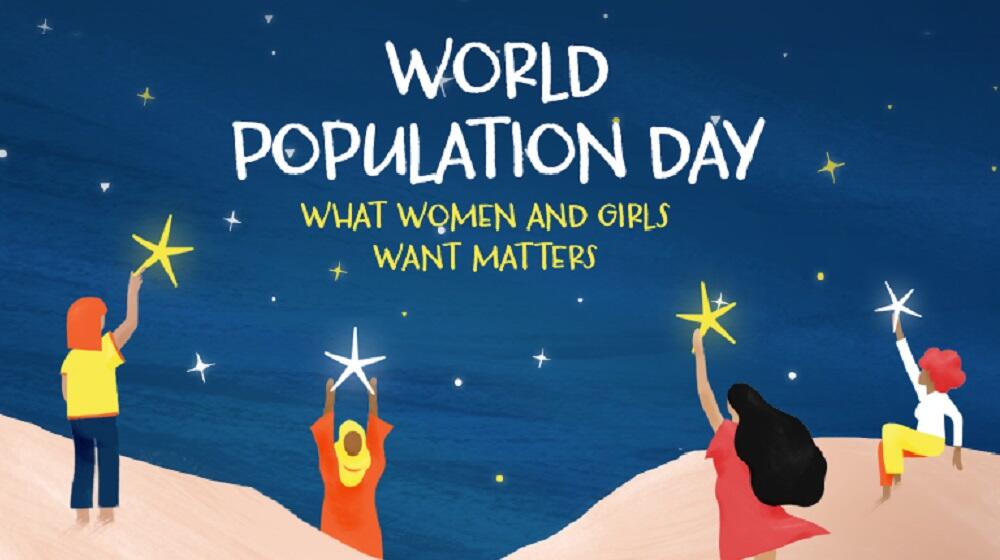BEIJING, China, 11 July 2023 – UNFPA, the United Nations Population Fund in China, China Population and Development Research Center (CPDRC) and China Population Association (CPA) organised a seminar in Beijing to observe the 34th World Population Day.
Themed “Unleashing the power of women amid the new normal of population dynamics in China,” the seminar brought together over 100 national and international experts. Drawing on international experience, it shared findings on gender equality and women’s development in China, and called for the government, public and private sectors to join hands to invest in gender equality and empower women to exert their rights freely in the context of low fertility and rapid population ageing in China.
“Women and girls make up half of the world’s 8 billion population. The creativity, ingenuity, resources and power of half the planet’s population are fundamental to addressing demographic and other challenges that threaten our future. When women and girls are empowered to exert autonomy over their lives and bodies, they and their families thrive,” says Ms. Ovesen, Deputy Representative of UNFPA in China.
“China always attaches great importance to the equality between women and men and women’s development, and improves its maternal and child health services. We need to respect and care for women, advocate for shared childcare responsibilities of couples, and build a fertility friendly society,” says Mr. Yang Jinrui, Deputy Director-General, Department of Population Surveillance and Family Development, National Health Commission of China.
China has embraced gender equality as a fundamental principle of its national policy. In pursuit of this goal, the country has introduced over 100 laws and regulations to protect women's rights, alongside offering protective services tailored to their specific needs.
In the realm of sexual and reproductive health, China has taken significant strides by providing comprehensive, cost-free basic healthcare services to pregnant women, covering all stages from pregnancy to childbirth and postnatal care. In the field of education, the gender gap in basic education has been nearly eradicated, with an impressive enrollment rate of 99.9 percent for both girls and boys in primary school. Furthermore, China's commitment to fostering female participation in science, technology, engineering, and mathematics (STEM) is exemplified by its status as the leading source of female applicants for the Patent Cooperation Treaty in 2021.
However, experts pointed out that despite China's commitment to gender equality, women in the country still face challenges in achieving a balance between their personal and professional lives, as well as realising their fertility aspirations.
One significant factor contributing to these challenges is the unequal distribution of domestic responsibilities between women and men, compounded by the limited availability of childcare services. Similar to many other countries worldwide, Chinese women bear the primary burden of unpaid care work. Surveys indicate that on average, Chinese women spend approximately 3 hours and 57 minutes on unpaid care work daily, while men spend around 1 hour and 34 minutes.
In light of the changing dynamics of the population in China, it becomes evident that greater efforts are needed to promote gender equality, address the conflicts between work and responsibilities within the home that many women experience, and ensure a fair distribution of family responsibilities, including childcare. The event concludes by emphasising the importance of such endeavours in achieving a more balanced and equitable society.
“We need to further empower women and harness the gender dividend, in order to promote high quality development of the Chinese population. CPDRC, as a national level advisory institute for policy making on population and development, will support the theme of this year’s World Population Day by deepening the research on women’s employment, education and reproductive health support, and providing advice in promoting gender equality and women’s development in China,” commented Dr. He Dan, Director-General of CPDRC.
Over 100 people from the government, research institutes, academic institutions, civil society, private sector, women and youth groups, media in China, UNFPA, UN Women, UNDP and other groups participated in the webinar.
- For more information on World Population Day 2023, please visit: https://www.unfpa.org/events/world-population-day.
- For more information on the seminar and UNFPA's work in China, please contact: Ms. Shujun Liu, Communications Analyst, UNFPA China, sliu@unfpa.org.


